Dear Members of the Postgraduate School of Thinking
And fellow life-long learners, how else to address the common desire to forward the process, interactions and horizons of thinking.
Welcome to the module in Thinking Complexity
From the point of view of biological life, ever more complex forms of organization over immense stretches of time, painstakingly lay the path leading to the process we today call thinking. And with it, in order to be able to comprehend via our thinking those very forms of complexity and their development, evidence is aggregating across multiple areas of studies, that we might need to re-organize the conceptual and historical networks upon which our thoughts take shape and compose themselves.
In this module we are going to introduce at least the critical points and concepts of the emerging perspective on Complexity, building on the interdisciplinary studies of complex adaptive systems, and rooting in various approaches to the study of the dynamics of systems in the natural, computer and social sciences. Complex systems populate our immediacy and our world far and wide. Think for example of how our social contacts grow and mutate producing a constant flow of structured information, of the way cities seem to have a will and character of their own, think of the modest ant colony in your garden and their surprisingly efficient strategies of foraging, sometimes all the way to the kitchen-top exactly when food is there, or of the birds flocking in the autumn sky and the remarkable way our emotional system respond to it.
In each of the cases described above the importance of context, uncertainty, multiplicity and heterogeneity of agents, together with surprise and novelty (thus unpredictability) do not yield to reduction, or reproducibility, nor allow one to gain significant insight from an approach based on universal principles. Such cases were often (until few decades ago) regarded by main stream science as a peripheral aspect of reality and irrelevant in terms of knowledge.
Yet, the extent and relevancy of wrapping our minds around complexity extend far beyond the ability to understand those particular phenomena. As a species of living organisms, we have perfected an incredible strategy in front of an uncertain, unknown and right down hostile environment: we constantly redesign, recreate and transform the environment around us. We are not unique in this, all life does it. But we are unique in terms of scale and impact achieved in a short period of time. We are an aggressively and impressively transformative force and thinking itself is by all means a part of this continuous performance, a stage in the transformation of matter and life, interlaced with the forces at play. As a result of our collective success as a race, in the world we inhabit, the level of connectivity and interdependence grew at new scales, allowing a number of new layers of complexity to emerge – social, technological, economical. Today transformative dynamics rapidly grow at the scale of enormous socio-technological systems, involving billions of interactions, redirecting virtual and real flows of resources. Can we extend our thinking at these scales? Which are the relevant cognitive means to perform such a feat? Is there a way in which we – individuals, communities and alliances – can relate to such dynamics?
The study of complex systems, provides us with clues on the multi-level dynamics at play within such heterogeneous and self-organizing conglomerates, focusing on emergent and macroscopic patterns, which can be identified across systems. For example, how coordination among their myriad elements can emerge without centralization, or how the ability to learn and adapt is developed in environments which are themselves complex. Complexity is not beyond our understanding, or at least not always, but it does require new ways of understanding and action.
We are going to discuss within the limits of the course, the historical development of the scientific paradigm and its impact on culture, and to explore few tools, from the seemingly more accessible, to the more complex:
- Storytelling, Metaphors, Visuals and POV (Point of View) approach,
- Maps and networks,
- Multi-agents simulations.
To begin with I would like you to perform an explorative mapping exercise:
Let’s begin simple. Focus on some-thing (i.e.: your preferred food or drink, object, gadget, shop, etc.) or some basic inter-action (i.e.: walking in a neighborhood, conversation, reading a book, learning, caretaking etc.) which you know well enough or are passionate about. There are no real limitations, take though something you do find interesting for whichever reason, it will make it a worthwhile exploration. Now begin to draw on a map (sketching is fine, and you can do it on digital, see here or here for example, or whichever other tool you are familiar with), all elements which are somehow connected. This is a tricky part, it will change according to what you chose, do not worry – there is no ‘right’ way, though different maps will allow you to cohere different understandings/insights. You may connect people/actors, places, things, materials, processes and more, try to place on one map all what is needed in order for the one thing/interaction from which you started to exist or take place. Keep on going. Keep on going.
Examples of maps (all these are big system maps, I do not expect you to compile such a wide research in the span of time we have, they are just interesting examples of the power of mapping):
Here you can find a number of wide maps relating to food industry:
A different example on building narratives:
https://vue.tufts.edu/narrative_construction
An interesting short talk by Igor Nikolic on mapping socio-technological complexity
https://www.youtube.com/watch?v=jS0zj_dYeBE
I also recommend you a few reading resources:
Following five differently Interesting introductions to Complexity. Read at least three.
- Sandra Mitchell; Unsimple Truths: Science, Complexity, and Policy. Chicago: University of Chicago Press (2009). Pg 1-5 ; 11-20
Here is the e-book, I recommend buying it, alternatively you can read pages 1 to 20.
- Edgar Morin; Restricted Complexity, General Complexity; published in Proceedings of ‘Intelligence de la complexité : épistémologie et pragmatique’, Cerisy-La-Salle, France, June 26th, 2005.
http://cogprints.org/5217/1/Morin.pdf
- Klaus Mainzer; Thinking in Complexity: the computational dynamics of matter, mind and mankind; Springer (2004). Read the Introduction pp. 1-13.
https://books.google.de/books?id=x9fqCAAAQBAJ&pg=PA5&source=gbs_toc_r&cad=3#v=onepage&q&f=false
- Kevin Kelly and Andrea Lloyd; Bootstrapping Complexity; KK Pacifica, CA (2011) Kindle Edition.
http://andreaslloyd.dk/wp-content/bootstrapping_complexity.pdf
- Richard Buchanan; Wicked Problems in Design Thinking; Design Issues, Vol. 8, No. 2 (Spring, 1992); The MIT Press. More relevant part on wicked problems in design from page 14.
http://web.mit.edu/jrankin/www/engin_as_lib_art/Design_thinking.pdf
I will provide further reading in the second part of our module.
Please complete the map exercise, and send it to me by the 8/3 in some digital format (pdf from an image for example). Bring it with you to class (digital in a format that can be projected – pdf, jpeg, ppt – or printed) so we can discuss together the questions that you can find here.
Also bring to class your laptop (if you have) or get organized to work in couple with a fellow student that has one. We will introduce basic simulations examples of complex adaptive systems.
Any questions can be addressed directly to me
Looking forward to our meeting
Sayfan G. Borghini


